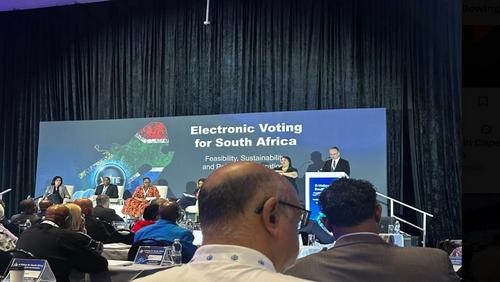411
IEC Opens Public Consultation on Electronic Voting in South Africa

South Africans have just six months to weigh in on one of the most significant electoral changes proposed in recent years: the introduction of electronic voting. The Electoral Commission of South Africa (IEC) has launched a public engagement drive to gather views from voters, political stakeholders, and civil society groups.
The initiative follows an international conference held in March where the IEC explored the feasibility of e-voting in the country. A comprehensive discussion document has since been released to guide debate and gather insights from the public.
Why Now?
According to IEC CEO Sy Mamabolo, the goal is to assess whether South Africa is ready—technologically, legally, and socially—to embrace a digital voting system.
“The discussion document lays out why e-voting is being considered, what the legal and constitutional implications are, and the practical options and costs,” said Mamabolo. “But public trust is key. That’s why this consultation is crucial—it must be accessible and inclusive.”
What’s on the Table?
The document explores several dimensions:
-
Benefits and risks of e-voting
-
Lessons from countries that have adopted or rejected it
-
Opinions of marginalised groups, including people with disabilities and rural voters
-
Infrastructure challenges, including internet connectivity and cybersecurity
-
Costs of implementing secure, reliable e-voting systems
Mamabolo emphasized that electronic voting won’t magically increase voter turnout. “People who’ve disengaged from the political process won’t vote just because the method has changed,” he noted. “Real engagement goes beyond technology.”
Young Voters in the Spotlight
The IEC is also doubling down on youth participation. Stats SA reports show that the youth population (18–34 years old) now makes up a third of South Africa’s total population, yet voter registration in this group is lagging behind.
To address this, the IEC is rolling out an awareness campaign targeting students and young professionals:
-
Registration ambassadors are being deployed to university and TVET campuses
-
Civic democracy drives will visit schools and colleges nationwide
-
Students are encouraged to register or update their information for future elections
Political Party Cleanup
In related news, the IEC has deregistered 53 political parties that failed to confirm their continued activity. Notices were sent to 192 parties, with only 132 responding to retain their registration status. This housekeeping effort ensures that only active, compliant parties remain on the commission’s books.
“Party registration confers legal protections and obligations,” Mamabolo explained. “If a party is inactive or fails to respond, we must remove them.”
What Happens Next?
South Africans now have until late October 2025 to submit their thoughts on e-voting. Feedback from the public will help shape future electoral policies and, potentially, a complete shift in how the country votes.
The IEC has made it clear: this isn’t just a technical question. It’s about transparency, accessibility, and building trust in the democratic process.
If you’ve ever wanted your voice to count—now’s the time to speak up.
{Source: Times Live}
Follow Joburg ETC on Facebook, Twitter , TikTok and Instagram
For more News in Johannesburg, visit joburgetc.com

















